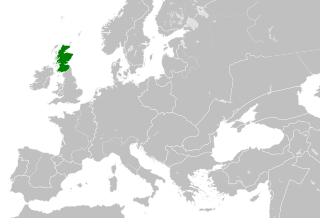Kingdom of Scotland (843–1707): Difference between revisions
More languages
More actions
General-KJ (talk | contribs) m (Added link to modern Scotland) Tag: Visual edit |
General-KJ (talk | contribs) m (Fixed spelling mistake) Tag: Visual edit |
||
| Line 6: | Line 6: | ||
=== Acts of Union === | === Acts of Union === | ||
The English took advantage of a weak [[Scotland|Scottish]] economy near bankrupted from the failure of the [[Darien Scheme]] to push the parliament into accepting a "union" between the two nations. The [[Scottish Parliament]] was abolished, and | The English took advantage of a weak [[Scotland|Scottish]] economy near bankrupted from the failure of the [[Darien Scheme]] to push the parliament into accepting a "union" between the two nations. The [[Scottish Parliament]] was abolished, and the 153 Scottish representatives dwindled to 45 allowed in the English Parliament, a number only one more than the English county of [[Cornwall]]. On 1st May 1707 the Acts of Union came into effect and Scotland was officially incorporated into England leaving the English Parliament in control of Scotland.<ref>{{Citation|author=Agnes Mure Mackenzie|year=1957|title=The Kingdom of Scotland: A Short History|title-url=https://annas-archive.org/md5/16c03ff5519b7c0a01641675bf8f5320|chapter=The Third Revolution|page=257-279}}</ref> | ||
== References == | == References == | ||
<references /> | <references /> | ||
[[Category:Medieval history]] | [[Category:Medieval history]] | ||
Revision as of 19:07, 21 January 2024
| Kingdom of Scotland Rìoghachd na h-Alba Kinrick o Scotland Kongungdum Skotland | |
|---|---|
 The Kingdom of Scotland in 1190 | |
| Capital | Scone (843–1452) Edinburgh (After 1452) |
| Dominant mode of production | Feudalism |
| Government | Monarchy |
The Kingdom of Scotland was a medieval and early modern state located on the northern part of the island of Great Britain. It existed until 1707 when it was officially annexed by the Kingdom of England to become the Kingdom of Great Britain.
History
Acts of Union
The English took advantage of a weak Scottish economy near bankrupted from the failure of the Darien Scheme to push the parliament into accepting a "union" between the two nations. The Scottish Parliament was abolished, and the 153 Scottish representatives dwindled to 45 allowed in the English Parliament, a number only one more than the English county of Cornwall. On 1st May 1707 the Acts of Union came into effect and Scotland was officially incorporated into England leaving the English Parliament in control of Scotland.[1]
References
- ↑ Agnes Mure Mackenzie (1957). The Kingdom of Scotland: A Short History: 'The Third Revolution' (pp. 257-279).


